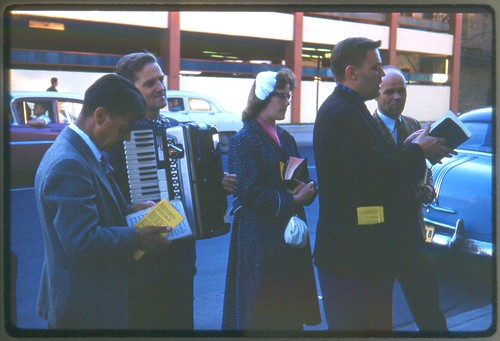
This week, the chapter I’m covering from James S. Bielo’s Words Upon the Word: An Ethonography of Evangelical Bible Study is all about “witnessing.” More on what that means in a moment. First, however, I’d like to mention an unexpected cameo.
In this chapter, Bielo focuses on a United Methodist Bible study led by Bill, a 51-year-old pastor with a degree from Asbury Theological Seminary. The group, made up of older men, has been reading Acts together.
They used the Life Guide series published by InterVarsity Press to structure their weekly readings. The series has study guides for all sixty-six books of the Christian Bible. The series is a favorite of Bill’s and one he has used in a variety of other groups. (114)
I wonder if they were using this guide by Phyllis Le Peau, wife of IVP associate publisher Andy Le Peau. It’s great to see InterVarsity appear in a book about Bible studies, and even better to see us in a chapter about witnessing.
Evangelicals and Witnessing
Bielo notes that “witnessing” —which others might call evangelism —is central to evangelicalism, regardless of the immediate outcome.
“Sharing the Good News of Jesus Christ” is a central motive in the Evangelical life and has always been a distinguishing trait of the movement in America (Noll 1992)[1. Mark Noll, A History of Christianity in the United States and Canada.]. The receptivity of non-Christians is rather inconsequential in the witnessing encounter. The guiding theology suggests that “God is using” the witness to “read” the nonbeliever. No matter what their stance is toward Christianity, they will eventually be overcome by “the Truth” and convert’Without fail, this potential disheartening scenario is framed by the uplifting biblical trope of seed planting —“they may not have converted right away, but you planted a seed that will stay with them.” (116)
While “witnessing” and “evangelism” can carry pretty heavy connotations for some people, the UMC Bible study observed by Bielo emphasizes “relational evangelism,” as described in Bill Hybels’ Becoming a Contagious Christian, another favorite of Pastor Bill’s.
Bible Study as Backstage
What does witnessing have to do with Bible study? Wouldn’t everyone in the Bible study already be a Christian? Yes, and that’s exactly the point.
When focused on events outside the group context, like witnessing, Bible study becomes what Erving Goffman (1961)[2. Erving Goffman, Encounters.] famously termed a “backstage encounter.” According to Goffman, social interactions can be divided into two basic classes. Public interactions —such as witnessing, in which performers (Evangelicals) and their audiences (non-Christians) are both present —function as “frontstage encounters.”’Every frontstage encounter is likely to have at least one backstage encounter —a corollary event in which only performers (Evangelicals as previous and potential witnesses) are present. Such backstage encoungers have immense social significance because they allow individuals to rehearse, reflect, and otherwise prepare for their next frontstage performance. (117)
That has certainly been my experience. Perhaps this says more about me than anything else, but I have been involved in far more “backstage” discussions of witnessing than actual witness encounters. (And each of those witnessing encounters has, in turn, been the subject of countless hours of reflection and deconstruction afterwards!)
Effective Witnessing
The kind of witnessing that Bielo has in mind, by the way, is the more-or-less spontaneous evangelism that emerges from everyday situations. This type of unplanned moment is very difficult to observe directly. The UMC Bible study provides Bielo with the opportunity, however, to record and analyze the Bible study members’ own descriptions and judgments of “effective” witnessing. He comes up with four key traits that are important to these evangelicals:
- Relevant rather than irrelevant
- Loving rather than judgmental
- Relational rather than superficial
- Focused rather than distracted
The first three points are self-explanatory, I think, but the last might not be. By “focused,” Bielo means “focused on the Gospel,” rather than “distracted” by other, less important topics. Interestingly, considering the current stereotype of evangelicals as obsessed with politics, Pastor Bill brings up politics as one of the topics that can distract from the gospel during a witnessing moment.
What are your thoughts?
- Have you been a part of “backstage” discussions about witnessing and evangelism?
- Do you find these discussions helpful as you seek to share the Gospel with others?
- What do you think of the four traits of “effective” witnessing that Bielo culls from the UMC Bible study?
Also in this series: Bible study as a social institution, Answering “Are you a Christian? Are you an academic?”,How do evangelicals read the Bible?, Intimacy in evangelical Bible studies, Textual economies of Bible studies
The former Associate Director for the Emerging Scholars Network, Micheal lives in Cincinnati with his wife and three children and works as a web manager for a national storage and organization company. He writes about work, vocation, and finding meaning in what you do at No Small Actors.

Leave a Reply